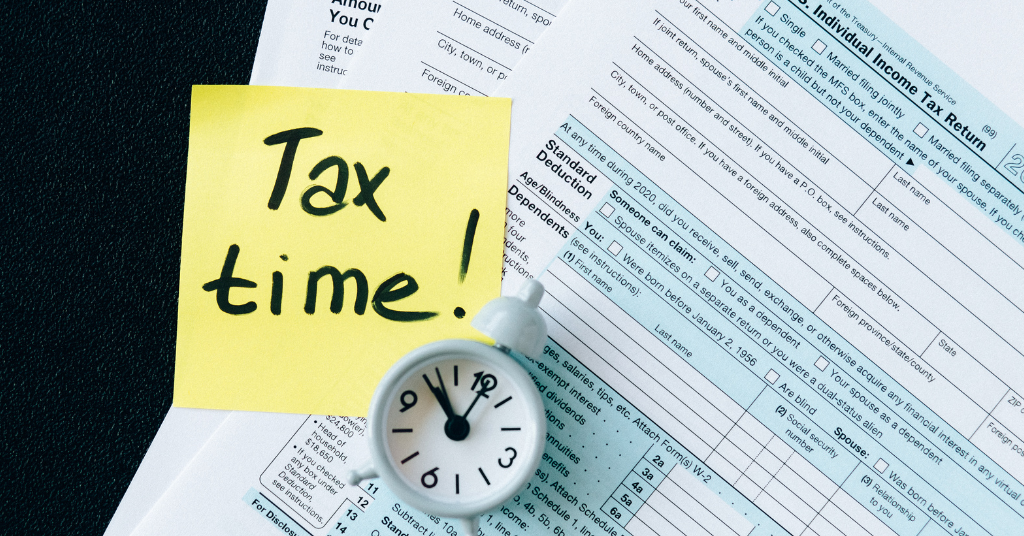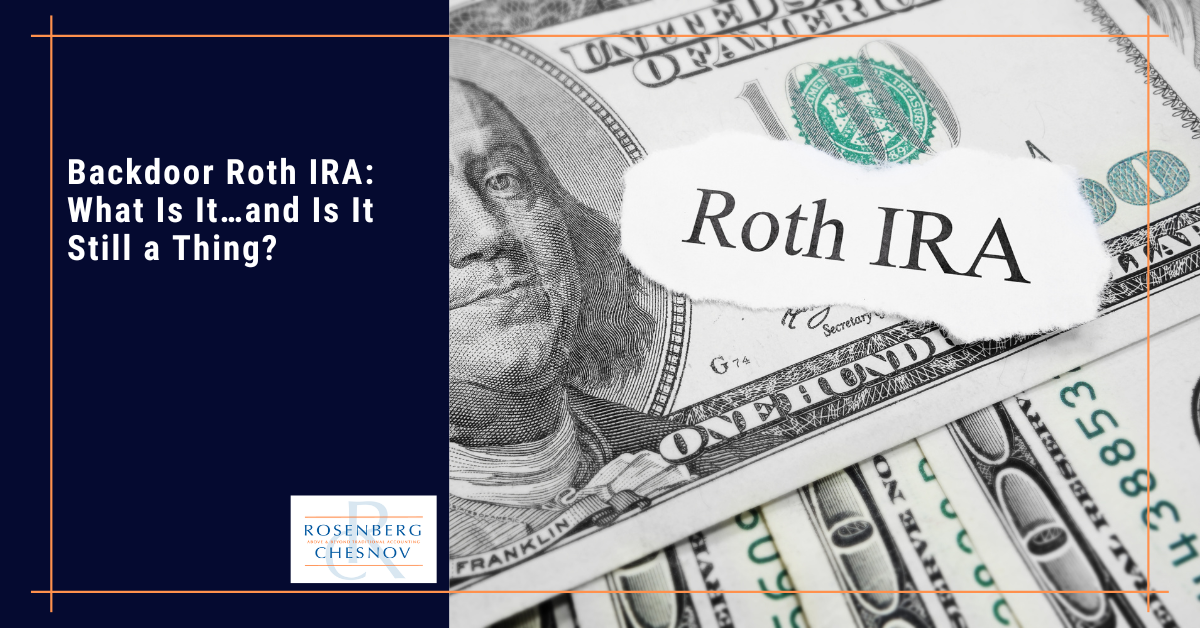

Maximize Your 2024 Refund: Tax Breaks You Might Be Missing
Category: Accounting
Planning is essential to maximizing your retirement tax strategy, and it’s never too soon to start. If you’re planning for retirement, you’ve likely heard the phrase “Backdoor Roth IRA.”
You may have heard that this strategy can offer advantages, like tax-free withdrawals and the flexibility to leave your money untouched until you need it. You may also have heard that Congress has had this enticing loophole on the chopping block, including as recently as this year.
So, if you’re looking to optimize your retirement strategy, where does that leave you? Is a Backdoor Roth IRA still allowed in 2023? Is it the right move for you? And just what exactly is a Backdoor Roth IRA, anyway?
In this post, we’ll dive deeper into these questions and more in an overview of everything you need to know about the Backdoor Roth IRA in 2023.


A Backdoor Roth IRA is a way of getting around the income caps on Roth IRA contributions.
What, however, is a Roth IRA, and why would you want to get around contribution limits?
Let’s start with some brief fundamentals…
A Traditional IRA, a type of tax-advantaged individual retirement account, allows people with earned income to save some of that income for retirement. You can contribute to an IRA with pre-tax or after-tax dollars and then invest that money; the contributions are often tax-deductible, and investment gains grow tax-deferred, meaning they are not taxed until you withdraw them during retirement.
The advantages of a Traditional IRA include avoiding paying tax now while earning interest, dividends, and capital gains tax-free over many years. Additionally, if you are in a high tax bracket now, you may be in a lower tax bracket in retirement. Since you will pay tax based on your retirement tax bracket, you may pay less tax overall.
This type of account also comes with some disadvantages. For example, there are annual maximum combined IRA contribution limits: $6,500 if you are under 50 and $7,500 if you are over 50. Moreover, a Traditional IRA comes with required minimum withdrawals, taxed as ordinary income at withdrawal time.
A Roth IRA is an attractive alternative for two significant reasons:
There are, however, income limits (unlike a Traditional IRA). If you earn more than $138,000 as an individual ($218,000 if married and filing jointly), your maximum allowable contribution decreases. And if you earn more than $153,000 (or $228,000 as a couple), you cannot contribute directly to a Roth IRA at all!
In simple terms, a Backdoor Roth IRA is a process by which you contribute to a Traditional IRA and then convert the account to a Roth IRA, thereby reaping the benefits of a Roth IRA while avoiding the income limits on your contributions.
This adds a level of complexity, but any bank or brokerage offering IRAs will have a quick and easy way to make this conversion—provided, of course, that institution allows conversions. (Most do, but it’s a good idea to double-check.)
By utilizing the Backdoor Roth IRA strategy, individuals can enjoy tax-free growth and tax-free withdrawals in retirement, regardless of their income level.
One important note: the Backdoor Roth IRA strategy has specific rules and considerations, and individuals should consult with tax professionals (like us!) to ensure compliance and understand the potential tax implications.
While discussions about potentially eliminating the Backdoor Roth have surfaced in recent years, as of 2023, this strategy is still permissible.
It’s important to note that future developments remain uncertain, and it is impossible to predict any potential changes that may occur. Once again, when in doubt, consult with an expert.
With so many sweeping changes to the United States tax code over the past few years, it’s easy to feel uncertain about which rules and restrictions still apply in 2023.
So let’s dive into some current information related to Backdoor Roth IRAs this year (while remembering that all of this is subject to change and does not constitute tax advice).
Since the Backdoor Roth process entails converting your Traditional IRA account to a Roth IRA after making contributions, the same limits apply to $6,500 if you are under 50 and $7,500 if you are over 50.
Furthermore, the IRS has introduced updated income phase-out ranges that determine the eligibility for contributions to a traditional IRA and Roth IRA.
Suppose an individual or their spouse is enrolled in a workplace retirement plan in the tax year. In that case, the maximum contribution to a traditional IRA may be gradually reduced or phased out to zero based on the taxpayer’s filing status and income. (It’s important to note that if neither the taxpayer nor their spouse is covered by a retirement plan at work, the phase-out rule does not apply.)
The 2023 phase-out ranges for a Traditional IRA are:
To put it simply: Anyone with income. It’s a loophole to get around limitations on Roth IRAs. So, if you can open a Traditional IRA account, and if your bank can convert it to a Roth IRA, then you are eligible for a Backdoor Roth IRA.
However, just because you can convert to a Roth IRA doesn’t mean you should.
The answer to this question depends entirely on the specific nuances of your unique financial circumstances. Broadly speaking, some considerations may impact your decision.
For example, factor in your current and future tax brackets, the expected growth of your investments, and the time value of money. If you’re in a low tax bracket now and anticipate being in a higher bracket later, converting some Traditional IRAs to Roth IRAs could be beneficial.
Conversely, if you’re in a high tax bracket now and expect a lower bracket in the future, taking advantage of tax savings today might be advantageous.
The time horizon also plays a role, as a longer investment period allows for significant growth before retirement.
First, there is a five-year wait to withdraw earnings tax-free, which can be a disadvantage if you’re close to retirement. Withdrawing contributions before meeting this five-year rule could result in income taxes and a 10% penalty.
Additionally, unlike a traditional IRA, you aren’t eligible for tax deductions in the year you contribute to a Roth IRA. However, you may qualify for the saver’s credit with income restrictions.
Moreover, there may be better choices than a backdoor Roth IRA if you can only pay the taxes with money from your IRA withdrawal, as it sacrifices future investment growth and could incur the 10% early withdrawal penalty. If you anticipate needing the converted money within five years or if the withdrawal pushes you into a higher tax bracket, it’s generally recommended to convert only enough to avoid a higher tax rate in that year.
Again, how you weigh these downsides against the potential benefits is unique to your situation. The best way to evaluate whether or not a Backdoor Roth IRA is a good idea for you is always to seek guidance from a tax professional.
If you are a client and would like to book a consultation, call us at +1 (212) 382-3939 or contact us here to set up a time.
If you aren’t a client, why not? We can take care of your accounting, bookkeeping, tax, and CFO needs so that you don’t have to worry about any of them. Interested? Contact us here to set up a no-obligation consultation.
Interested in receiving updates in your mailbox? Check out our newsletter, which is full of information you can use. It comes out once every two weeks, and you can register for it below.


Category: Accounting


Category: Accounting


Category: Accounting
Send us a message and we will contact you as soon as possible.
Send us a message and we will contact you as soon as possible.
Jeff Coyle, CPA, Partner of Rosenberg Chesnov, has been with the firm since 2015. He joined the firm after 20 years of business and accounting experience where he learned the value of accurate reporting, using financial information as a basis for good business decisions and the importance of accounting for management.
He is a diligent financial professional, able to manage the details and turn them into relevant business leading information. He has a strong financial background in construction, technology, consulting services and risk management. He also knows what it takes to create organizations having built teams, grown companies and designed processes for financial analysis and reporting.
His business experience includes:
Creating and preparing financial reporting, budgeting and forecasting.
Planning and preparation of GAAP and other basis financial statements.
Providing insight on financial results and providing advice based on those results.
Jeff also has a long history of helping individuals manage their taxes and plan their finances including:
Income tax planning and strategy.
Filing quarterly and annual taxes.
Audit support.
General financial and planning advice.
Prior to joining the firm in 2015, Jeff was in the private sector where he held senior financial and management positions including Controller and Chief Financial Officer. He has experience across industries, including construction, technology and professional services which gives him a deep understanding of business.
Jeff graduated from Montclair State University, he is a CPA and member of the American Institute of Certified Public Accountants, New York State Society of Certified Public Accountants and New Jersey State Society of Public Accountants.
Jody H. Chesnov, CPA, Managing Partner of Rosenberg Chesnov, has been with the firm since 2004. After a career of public accounting and general management, Jody knows the value of good financials. Clarity, decision making, and strategy all start with the facts – Jody has been revealing the facts and turning them into good business results for more than three decades.
He takes a pragmatic approach to accounting, finance and business. His work has supported many companies on their path to growth, including helping them find investors, manage scaling and overcome hurdles. His experience and passion for business reach beyond accounting and he helps businesses focus on what the numbers mean organizationally, operationally and financially.
He has a particular expertise in early-stage growth companies. His strengths lie in cutting through the noise to come up with useful, out of the box, solutions that support clients in building their businesses and realizing their larger visions.
Prior to joining the firm in 2004, Jody was in the private sector where he held senior financial and management positions including General Manager, Chief Financial Officer and Controller. He has experience across industries, which gives him a deep understanding of business.
Jody graduated with a BBA in Accounting from Baruch College, he is a CPA and member of the American Institute of Certified Public Accountants and New York State Society of Certified Public Accountants.
In addition to delivering above and beyond accounting results, Jody is a member of the NYSCPA’s Emerging Tech Entrepreneurial Committee (ETEC), Private Equity and Venture Capital Committee and Family Office Committee.
He is an angel investor through the Westchester Angels, and has served as an advisor for many startup companies and as a mentor through the Founders Institute.